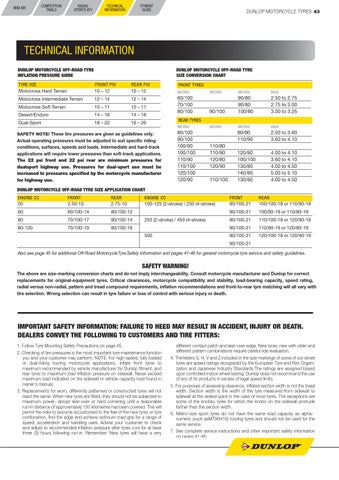MINI MX
COMPETITION TRIALS
RADIAL SPORTS ATV
TECHNICAL INFORMATION
FITMENT GUIDE
DUNLOP MOTORCYCLE TYRES 43
TECHNICAL INFORMATION DUNLOP MOTORCYCLE OFF-ROAD TYRE INFLATION PRESSURE GUIDE
DUNLOP MOTORCYCLE OFF-ROAD TYRE SIZE CONVERSION CHART
TYRE USE
FRONT PSI
REAR PSI
FRONT TYRES
Motocross Hard Terrain
10 – 12
10 – 12
METRIC
Motocross Intermediate Terrain
12 – 14
12 – 14
Motocross Soft Terrain
10 – 11
10 – 11
Desert/Enduro
14 – 18
14 – 18
60/100 70/100 80/100
Dual-Sport
18 – 22
16 – 26
applications will require lower pressures than soft-track applications. The 22 psi front and 22 psi rear are minimum pressures for dualsport highway use. Pressures for dual-sport use must be increased to pressures specified by the motorcycle manufacturer for highway use.
METRIC
INCH
90/100
90/80 90/80 100/80
2.50 to 2.75 2.75 to 3.00 3.00 to 3.25
REAR TYRES METRIC
SAFETY NOTE! These tire pressures are given as guidelines only. Actual operating pressures must be adjusted to suit specific riding conditions, surfaces, speeds and loads. Intermediate and hard-track
METRIC
80/100 90/100 100/90 100/100 110/90 110/100 120/100 120/90
METRIC
110/80 110/90 120/80 120/90 110/100
METRIC
INCH
80/90 110/90
2.50 to 3.60 3.60 to 4.10
120/80 100/100 130/80 140/80 130/80
4.00 to 4.10 3.60 to 4.10 4.00 to 4.50 5.00 to 5.10 4.00 to 4.50
DUNLOP MOTORCYCLE OFF-ROAD TYRE SIZE APPLICATION CHART ENGINE CC
FRONT
REAR
ENGINE CC
FRONT
50
2.50-10
2.75-10
100-125 (2-stroke) / 250 (4-stroke)
80/100-21
100/100-18 or 110/90-18
60
60/100-14
80/100-12
90/100-21
100/90-19 or 110/80-19
80
70/100-17
90/100-14
80-100
70/100-19
90/100-16
250 (2-stroke) / 450 (4-stroke) 500
REAR
80/100-21
110/100-18 or 120/90-18
90/100-21
110/90-19 or 120/80-19
80/100-21
120/100-18 or 120/90-19
90/100-21 Also see page 45 for additional Off-Road Motorcycle Tyre Safety Information and pages 41-46 for general motorcycle tyre service and safety guidelines.
SAFETY WARNING! The above are size-marking conversion charts and do not imply interchangeability. Consult motorcycle manufacturer and Dunlop for correct replacements for original-equipment tyres. Critical clearances, motorcycle compatibility and stability, load-bearing capacity, speed rating, radial versus non-radial, pattern and tread compound requirements, inflation recommendations and front-to-rear tyre matching will all vary with tire selection. Wrong selection can result in tyre failure or loss of control with serious injury or death.
IMPORTANT SAFETY INFORMATION: FAILURE TO HEED MAY RESULT IN ACCIDENT, INJURY OR DEATH. DEALERS CONVEY THE FOLLOWING TO CUSTOMERS AND TIRE FITTERS: 1. Follow Tyre Mounting Safety Precautions on page 45. 2. Checking of tire pressures is the most important tyre-maintenance function you and your customer may perform. NOTE: For high-speed, fully loaded or dual-riding touring motorcycle applications, inflate front tyres to maximum recommended by vehicle manufacturer for Dunlop fitment, and rear tyres to maximum load inflation pressure on sidewall. Never exceed maximum load indicated on tire sidewall or vehicle capacity load found in owner’s manual. 3. Replacements for worn, differently patterned or constructed tyres will not react the same. When new tyres are fitted, they should not be subjected to maximum power, abrupt lean-over or hard cornering until a reasonable run-in distance of approximately 150 kilometres has been covered. This will permit the rider to become accustomed to the feel of the new tyres or tyre combination, find the edge and achieve optimum road grip for a range of speed, acceleration and handling uses. Advise your customer to check and adjust to recommended inflation pressure after tyres cool for at least three (3) hours following run-in. Remember: New tyres will have a very
different contact patch and lean-over edge. New tyres, new with older and different pattern combinations require careful ride evaluation. 4. The letters S, H, V and Z included in the size markings of some of our street tyres are speed ratings recognized by the European Tyre and Rim Organization and Japanese Industry Standards.The ratings are assigned based upon controlled indoor wheel testing. Dunlop does not recommend the use of any of its products in excess of legal speed limits. 5. For purposes of assessing clearance, inflated section width is not the tread width. Section width is the width of the tyre measured from sidewall to sidewall at the widest point in the case of most tyres. The exceptions are some of the knobby tyres for which the knobs on the sidewall protrude farther than the section width. 6. Metric-size sport tyres do not have the same load capacity as alphanumeric (such asMT90H16) touring tyres and should not be used for the same service. 7. See complete service instructions and other important safety information on pages 41-46.
